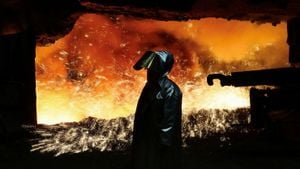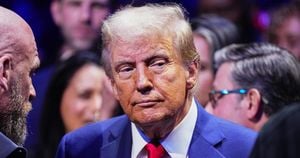President-elect Donald Trump is moving quickly to fill positions within his second Cabinet, seeking individuals who align closely with his agenda and loyal to his vision. This selection reflects his determined efforts to solidify support among his base and move forward with policies reminiscent of his first administration. With key nominees already announced, including several past congressional allies, Trump is signaling his intentions for the path of his second term.
Many of Trump's selections echo loyalty and common ground, emphasizing ties to the Make America Great Again (MAGA) movement. Noteworthy nominees include Representative Elise Stefanik from New York as Ambassador to the United Nations, and Lee Zeldin, nominating to head the Environmental Protection Agency (EPA). Others nominated include John Ratcliffe for the CIA and Doug Collins for the Department of Veterans Affairs, all of whom played significant roles during Trump’s first term and participated as lead figures during his impeachment defense.
Trump's selection of Pam Bondi for the role of Attorney General rounds out this core group, as she has not only defended Trump's actions but has also been key in challenging results from the 2020 election. South Dakota Governor Kristi Noem has been named Secretary of Homeland Security, showcasing Trump's aim to capitalize on strong relationships forged during their interactions.
While the lineup prominently features staunch MAGA supporters, it is not without its surprises. Marco Rubio, previously one of Trump's fiercest rivals, has been chosen for Secretary of State, and Scott Bessent, who contributed financially to Democrats, is slated to become Treasury Secretary. There is also North Dakota Governor Doug Burgum, who initially ran against Trump before endorsing him, sought to lead the Department of the Interior.
Trump’s Cabinet selections also bring forth historical milestones. The administration’s diversity is somewhat evident, with women leading several prominent departments—including Noem at Homeland Security, Bondi at Justice, and Lori Chavez-Deremer at Labor. Notably, the role of White House Chief of Staff is being filled by Susie Wiles, marking the first time this position will be held by a woman. This selection could be pivotal as Trump aims to counter issues he faced with female voters during the last election.
Beneath the surface of loyalty and past ties lies the reflection of varied political ideologies within Trump’s Cabinet choices—a blend of conservatives and former Democrats. The choosing of Tulsi Gabbard, who has made controversial statements about U.S. foreign policy, adds complexity to the policy perspectives represented.
Hoffman, of the Independent Women’s Forum, expressed optimism for the incoming administration's energy policies, highlighting Trump's appointees for the Department of Energy and EPA as fundamentally aligned with promoting fossil fuel production. With veterans of the energy industry positioned to lead these departments, expectations hinge on their abilities to shift the U.S. back to energy dominance through deregulation of traditional energy sources such as coal, oil, and gas.
Gabbard’s potential role, especially at the National Intelligence Directorate, is fraught with anticipation. Throughout her previous legislative tenure, she faced scrutiny over her foreign policy stances, and her confirmation process could prove to be altercative to her nomination.
Trump's transition team, challenged by ethical compliance requirements, has significantly slowed outreach to agencies like the Department of Agriculture, led by nominee Brooke Rollins. Tensions and logistical barriers could delay onboarding new nominees, affecting the administration’s ability to address current agricultural crises, such as avian influenza outbreaks impacting U.S. dairy and poultry sectors. Until the ethics documents are signed, much needed information flow between agencies and the Trump team remains stalled, potentially hindering pivotal efforts from day one.
Concern exists over the viability of certain nominees amid looming confirmation battles. The Republican majority could provide support, but elements of GOP dissonance have emerged, as seen with the withdrawal of Matt Gaetz from consideration for Attorney General amid serious allegations. Potential difficulties could also manifest for nominees like Hegseth, who faces allegations of inappropriate conduct, and Kennedy’s reputation as an anti-vaccine advocate may come under scrutiny during confirmations. The pressure surrounding such confirmations adds another layer of complexity to the transition process.
Looking to energy matters, former Congress members and energy sector professionals have been touted by Trump, aiming for significant regulatory rollbacks initiated on his first day. Chris Wright, CEO of Liberty Energy, nominated for Energy Secretary, carries the expectation of leading the charge for the U.S. to promote more fossil fuel use, showcasing Trump's agenda to position the nation back to energy independence.
The incoming administration's strategy is anticipated to lean heavily on executive orders to circumvent legislative stalemates, much like previous administrations have employed. This could translate to immediate action on environmental regulations and the pursuit of fossil fuel extraction.
Even as the Trump administration signals major changes on energy policies, concerns arise with both international and state regulatory landscapes. Critics note the expected withdrawal from the Paris Climate Accords could affect the U.S. stance on global climate change initiatives, bringing significant opposition from environmental groups and pro-climate citizens. States, particularly California, still possess powerful network abilities to implement local regulations, which may impose limits on national energy strategies.
With significant judicial challenges expected on the newly proposed climate policies, the appointment of aggressive yet pragmatic leaders could redefine regulatory action under Trump's second term. This new Cabinet is not only about the choices made but also about the historical and political climates surrounding them, shaping the future direction of the U.S. under Trump's governance.



